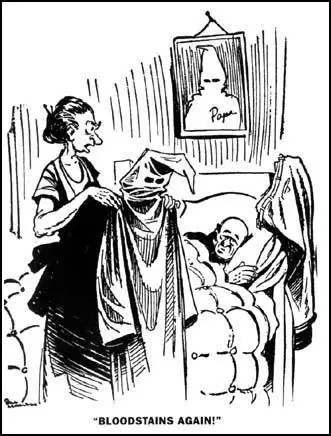Eugene Talmadge
Eugene Talmadge was born in Forsyth, Georgia, on Sept. 23, 1884. After he graduated from the University of Georgia in 1907, Talmadge practiced law in Atlanta before moving to Montgomery County.
A member of the Democratic Party, he successfully ran for the office of Commissioner of Agriculture in 1926. Six years later he was elected governor of Georgia. Talmadge's main support came from white farmers and his right wing views earned him the name, the "Wild Man from Sugar Creek".
Once in power Talmadge dramatically cut budgets resulting in massive reductions in state services. He also helped local businessmen in their opposition to trade unions.
Talmadge was an outspoken opponent of President Franklin Roosevelt and his New Deal policies that he described as a combination of wet nursing, frenzied finance, downright Communism and plain dam foolishness." He also controversially claimed that the Civilian Conservation Corps (CCC) were "bums and loafers." He also disliked what he considered to be Roosevelt's pro trade union legislation such as the National Labour Relations Act . When a textile strike broke out in 1934, Talmadge declared martial law and sent troops to deal with strikers.
Talmadge was also opposed to black civil rights and in 1941 attempted to fire two University System administrators, allegedly for advocating integrated public schools. When the Board of Regents refused, Talmadge dismissed all of them and replaced them with people amenable to his will. This led to ten Georgia public colleges and universities losing their accreditation.
Talmadge was elected as governor of Georgia in 1932, 1934, 1940 and again in 1946. However, he was in poor health and died before he could take office. He was now replaced by his son, Herman Talmadge, as governor of Georgia.
In 1954 Stetson Kennedy published his book, I Rode With the Ku Klux Klan, revealing how Talmadge used the Ku Klux Klan during elections to stop African Americans from voting in Georgia.

Primary Sources
(1) In his book, I Rode With the Ku Klux Klan, Stetson Kennedy described the the 1946 election for the Governor of Georgia.
Talmadge was elected Governor of Georgia after a whirlwind campaign of Klan terror aimed at keeping Negroes from going to the polls. On the eve of the election, fiery crosses had flamed on court-house lawns all over Georgia. Notices signed "KKK" were tacked on to Negro churches, warning, "The first ****** who votes in Georgia will be a dead one." Other warning were sent to Negroes through the U.S. mails, and others were dropped from airplanes over Negro neighbourhoods.
On election day, thousands of Negroes awoke to find miniature coffins on their doorsteps. My union friend Charlie Pike led his locals, white and Negro alike, to march to the polls and vote as a body. And though many thousands of Negroes defied the Klan and voted for the first time, in the end the forces of hate carried the day, Talmadge was elected, and the liberal supported by Governor Arnall was defeated.
